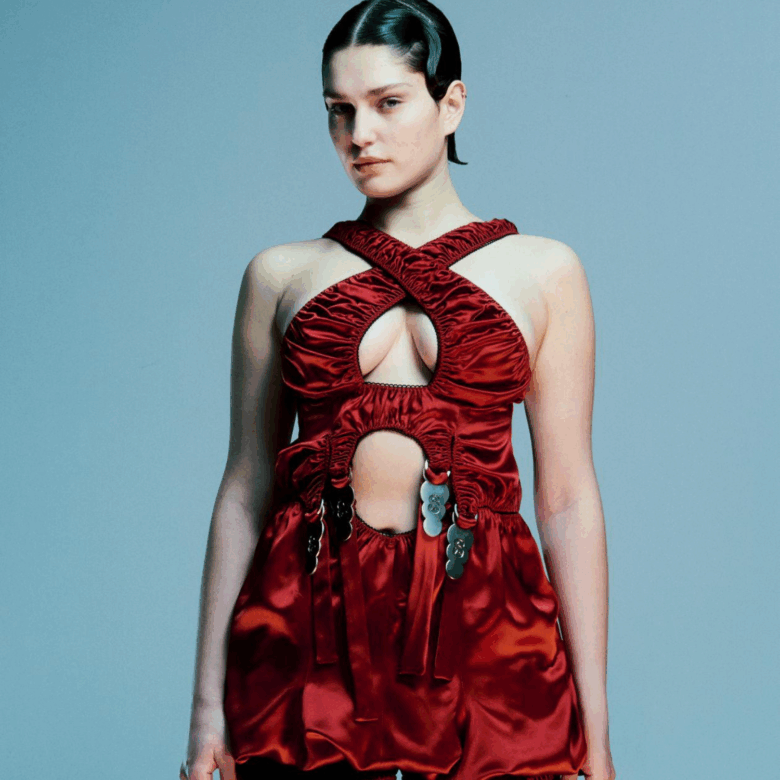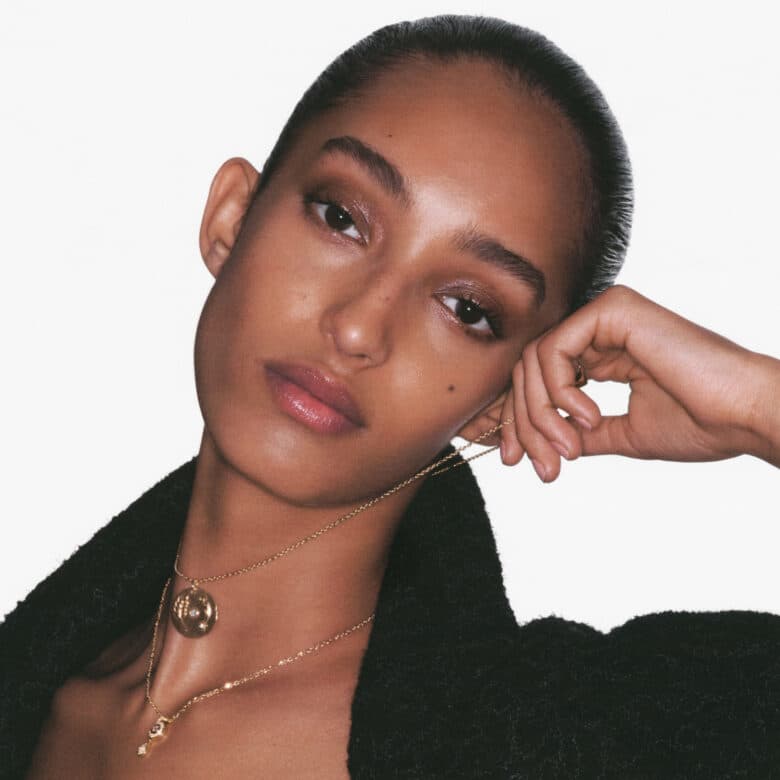Cailee Spaeny on becoming Priscilla Presley: “I was taken aback by how moving and relatable her story is”

Minus the raven hair, eyeliner and reams of falsies, Cailee Spaeny — beaming at me over Zoom from her home in Missouri — is virtually unrecognisable from her on-screen counterpart in Sophia Copolla’s Priscilla. The film, released to critical acclaim last month, is less of a biopic than a dissection of a specific chapter in Priscilla life: Elvis (played by Jacob Elordi). It’s a breath of fresh air when it comes to the 78-year-old, who in the public consciousness has remained coupled with her former husband from their first paparazzi shot, through to her 1985 memoir, Elvis and Me (which the film is based on), and into the present day.
Coppola is no stranger to capturing the formative moments and feelings in women and girls’ lives — the angst, yearning, effluvia, and interiority — and so, Priscilla is less specific than its title will lead you to believe, without shying away from the uncomfortable truths. Elvis did take a 14-year-old girl away from her family, quarantine her in Graceland, and get her hooked on pills, yes, but there is also a more subtle exploration of universal events: the flush of first love, its febrile chokehold, and the strength needed to leave. As Spaeny tells me: “I was really taken aback by how moving her story was and how relatable it is to other women who can empathise with the milestones she goes through in her life.” Below, HUNGER catches up with the actor about transforming into Priscilla, and the ubiquity of human connection.

Nessa Humayun: You already knew a fair bit about Elvis and Priscilla before going into this project as your mother was an Elvis memorabilia collector, but portraying someone really involves subsuming yourself in their lives, and almost becoming them. What did you learn about them both during that process?
Cailee Spaeny: That was the thing that was so interesting and challenging about taking on this role, it was drawing back the curtain on who these people were behind closed doors. Sometimes Jacob [Elordi] and I would go into a day like it was a relationship drama and just try to really ground them. I think what we see here is the side effects of fame and the impact that it had on their relationship. We tried to do our best to make sure we showed the lows, but also the highs, and just tried to put the truth on screen and let people decide how they felt about that.
NH: When you’re inhabiting a real-life person, you need to find a way to relate to them — how did you achieve that when it came to Priscilla? It’s a bit of a reach, but I know that you also dropped out of school at a young age, not for a relationship, sure, but to pursue acting…
CS: That’s something that Priscilla and I talked about — how we were similar as young girls. We were always getting told that “you’re a very old soul”, and we were interested in what made us that way. Initially, I was worried about finding some sort of connective tissue between us, but then I was really taken aback by how moving her story was and how relatable it is to other women who can empathise with the milestones she goes through in her life. It’s even just falling in love for the first time, and how amazing that feeling is — you’d do anything you can to hold onto that even if it means losing yourself along the way… Eventually, you have to pick up the pieces and figure out who you are outside of the relationship. I found it really moving. It’s obviously a very heightened and specific life she’s had, but I think the moments she goes through emotionally are ones that a lot of people can see themselves in.

NH: Another thing I noticed when I was watching the film is your physicality. You can see your body shrink and then rise up as Priscilla grows and matures. Was that something you were conscious of?
CS: In my prep, I tried to take note of how young women hold themselves. They just have a huge amount of insecurity and it shows in their body language, even when they’re trying to put on that they’re not insecure! I tried to make decisions and differentiate how I was going to play each age in terms of body language and movement, but then I turned up on the first day and we only had 30 days to shoot, and we did it wildly out of order… I guess you cross your fingers that you’ve done the right amount of research and made the right choices. But it was really the hair, makeup and costumes that reminded me of her emotional arcs, which would then inform my movements.
NH: It’s interesting how makeup can literally allow you to become a different person, especially someone who had such a specific look.
CS: It’s great for me as an actor! It also told me so much about where she was emotionally via the performativity of it all. She wore it to represent a brand, but also all the rules she had in terms of what she could and couldn’t wear. Then she decided to break those rules when she was coming into her own. Elvis didn’t like her wearing denim because it reminded him of his poor childhood, but at the end, we see her wearing bell bottom jeans.
NH: I think Sophia was the perfect director to make this film — she’s so great at portraying the angst of girlhood. How did she help you get in character?
CS: We had a lot of conversations about what the big questions were, the things we found mysterious about Priscilla, what she was thinking, and how she got to certain points in her life and eventually found the strength to leave. She really just told me to go off and answer those questions privately — she never tries to interject too much and she’s not controlling or nitpicky. Sophia always gives a lot of space, she’ll come in and nudge a scene this way or that way, but really, she’s a great bouncing board. She has such an incredible knowledge of cinema history, and she uses photography and music to help us immerse ourselves. She’s very giving, generous and kind. She doesn’t feel the need to prove herself when she walks onto set, she gives up space for others to make their own creative decisions while also being distinct in her vision. As an actor, you want to work with a director like that.

NH: You were lucky enough to have quite a bit of access to Priscilla. What was the most helpful snippet of information that you got from her?
CS: Priscilla really took the time to explain the type of young woman she was; soft spoken and shy… But the thing she really left me with was the need to show the love between her and Elvis. They obviously went through their hardships and had a very complicated relationship, but when she looks back at this time in her life, she mostly has fond memories. I wanted to make sure it was a balanced story and show that both [the good and bad elements] could be there and true at the same time.
NH: As you’ve mentioned, a lot of ordinary women can really relate to elements of Priscilla’s story. Personally, what do you think you’ll carry forward from it?
CS: The whole process was really cathartic for me. I had just gotten out of a long term relationship, my first love, and I used this time, and all the meditating on her life, to help me work out some questions about the journey I was on. Her story gave me the strength to find out who I was outside of that relationship. It can be a relationship, family, or a job, but you need to ask yourself big questions about what you stand for, your wants and your needs… That’s what I’ll always carry with me. I hope that other young women can find parts of themselves in her story too.
Priscilla is in cinemas now

